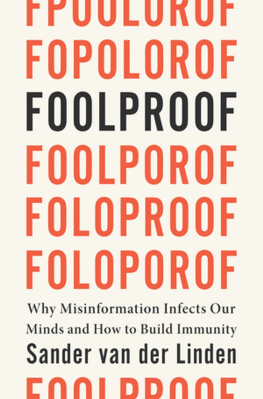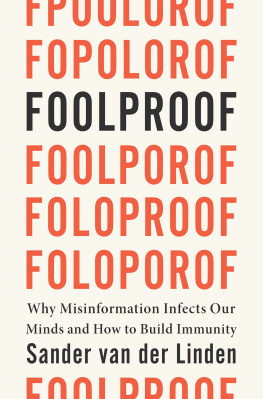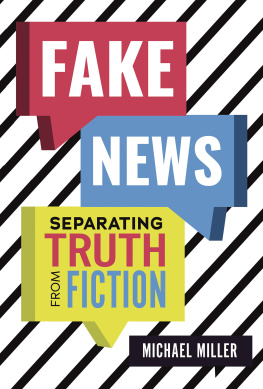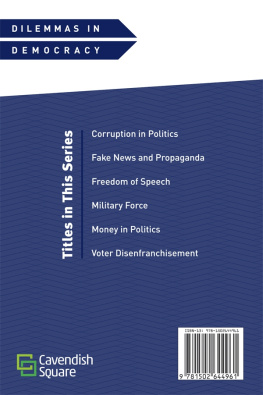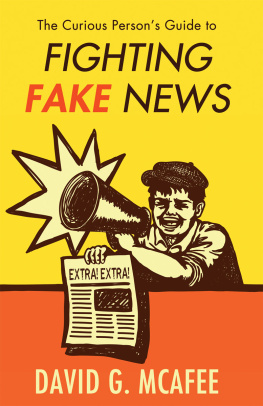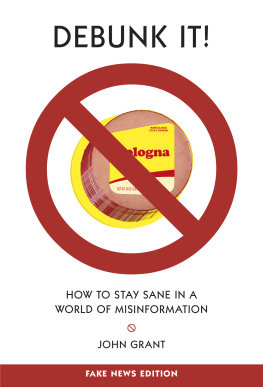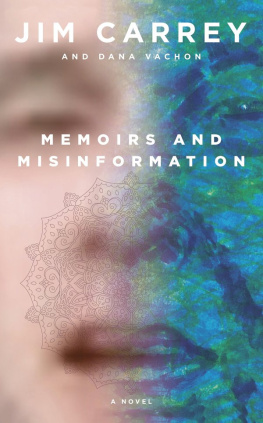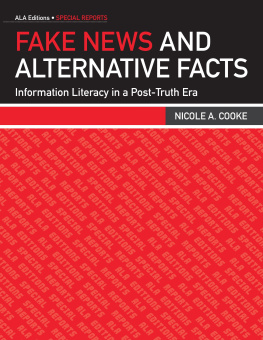FOOLPROOF
Why Misinformation Infects Our Minds and
How to Build Immunity
SANDER VAN DER LINDEN

W. W. NORTON & COMPANY
Celebrating a Century of Independent Publishing
For Gavi
Kirkby is a relatively small town in the borough of Knowsley, in the northwest of England. Boasting a little over 40,000 inhabitants, its the birthplace of poet Robert Atherton, the actor Stephen Graham -and a man youve probably never heard of, until now: Michael Whitty. Whitty is a dad of three. He volunteers for a local charity and operates an airport parking facility. He has also been developing some unusual ideas, slowly but steadily, with the assistance of a trusted friend, the internet.
On Sunday 5 April 2020, Whitty and two accomplices drove out to Coopers Lane, Kirkby, where they set fire to a phone mast owned by Vodafone. Whitty put on a pair of gloves, forced open the equipment box, and used some firelighters to set the whole thing ablaze. This wasnt a heat of the moment decision; later police investigations show that the arson was carefully premeditated. Whitty was convinced that the latest 5G (fifth-generation) phone masts were somehow linked to the coronavirus pandemic that had recently seized the world in its grip. Evidence obtained from Whittys phone suggests that he spent a considerable amount of time researching 5G technology and discussing it with others in online chat rooms. His anxiety about new technology and health, whilst perhaps understandable, is actually based on a false and debunked conspiracy theory that radiation from 5G phone masts lowers our immune systems and can thereby cause or exacerbate the spread of Covid-19.
Nearly four years earlier, in the run-up to the 2016 US presidential election, Edgar Maddison Welch, a twenty-eight-year-old father of two from North Carolina, walked into the Comet Ping Pong pizzeria in Washington DC carrying a loaded semi-automatic assault rifle. He was under the impression that presidential candidate Hillary Clinton was hiding young children in the basement there as part of a secret child-sex-trafficking ring. Like Whitty, Welch had developed genuine concerns (in his case, about the possible abuse of children, the so-called Pizzagate scandal) after reading dozens of fake news articles which had been shared widely online by celebrities and politicians.
A common response to such events is to dismiss them as the actions of single individuals. Outliers. Most people arent fooled by fake news. But is this really the case? How confident are you that your vote wasnt influenced by micro-targeted misinformation? How much of what we read on social media is false or if not plain false, designed to make us think or feel a certain way? Whitty and Welch are not alone. The truth is that at a basic cognitive level we are all susceptible to misinformation.
A total of at least fifty phone masts have been set ablaze throughout the UK because of widespread misinformation that 5G masts are somehow linked to the spread of Covid-19. Scientific research later confirmed that belief in the 5G conspiracy is linked to violent intentions. In 2020, my Cambridge colleagues and I surveyed the population in the UK, the United States, Mexico, and Spain, and directly asked people if they believed that the 5G network was making us more susceptible to the coronavirus. The estimates from our study ranged from 10 to 17 per cent of the population in each country. If that sounds low to you, consider that even just 10 per cent means that over 7 million people in the UK and about 32 million people in the US report holding such beliefs. Moreover, if 10 per cent is all it takes for people to start setting phone masts on fire, we should be concerned about what wider spread of these beliefs might entail for society.
The 2021 attack on the United States Capitol, which sought to challenge Joe Bidens presidential victory, is a chilling reminder of the damage that a misinformed crowd can inflict. The false claim from former President Donald Trump that Democrats had stolen the election by committing widespread voter fraud, was frequently repeated on social media and conservative cable news. These bogus claims ranged from mysterious vote dumps for Joe Biden and election officials pulling suitcases of ballots out from under a table, to dead people voting. Dubbed the Tsunami of Untruth by fact-checkers, Trump has made over 30,000 false or misleading claims during his presidency.
The violent riots at the Capitol may not have been a consequence of misinformation alone, but an extensive investigation by the independent fact-checker PolitiFact, who reviewed the files of over 400 of those arrested, showed that in at least half of the cases, misinformation shaped the defendants beliefs and actions. Many of those arrested had been highly active on social media; several even cited being duped by fake news as a defence in court. A lot of them were just like Whitty and Welch.
Take, for example, twenty-seven-year-old Anthony Antonio, a solar panel salesman from the suburbs of Chicago. Antonio had no prior interest in politics. He hadnt even voted in a presidential election before. After being laid off work during the pandemic, Antonio said that he simply got bored. He started watching Fox News on repeat, tuned into right-wing social media and became consumed with conspiracy theories that the presidential election had been rigged. On 6 January 2021 he wore a bulletproof vest with insignia of a far-right militia group. He was charged with five counts, including disorderly conduct and violent entry of the Capitol.
Referring to the torrent of misinformation that engulfed his client, his lawyer said: You can catch this disease.
But the spread of dangerous misinformation is not just a Western issue. In April of 2018, false videos with warnings of local child-traffickers in southern India circulated on WhatsApp, claiming that more than fifty children had been abducted in the area. These messages incited a mob of around 200 people to attack an innocent family, dragging them from their car, beating one to death and leaving others critically injured. The messages triggered a spate of similar assaults. The now infamous Indian WhatsApp Lynchings often follow the circulation of fake news videos and messages on the platform. For example, later that year, two men were beaten to death and seven others injured after fake messages about local robbers were distributed on WhatsApp. In early 2020 in Iran, hundreds of deaths and thousands of hospitalizations including children were attributed to mass poisonings, after people were fooled by false social media claims that ingesting toxic alcohol-based products would help neutralize the coronavirus.
In short, fake news can get you killed.
Even an optimistic account of our ability to spot fake news has to come to grips with the fact that not everyone needs to be fooled in order for misinformation to be highly influential and dangerous. After all, major elections are often decided on small margins, and cyber propaganda is playing an increasingly important role in tearing down the fabric of our democracy. In early February of 2022, Russian propagandists flooded the media with fake videos supposedly portraying Ukrainian acts of aggression and attacks on Russian territory in order to create a pretext for the planned invasion. Some of the social media images were taken from Israeli airstrikes on Gaza; other footage came directly from the tactical shooter video game, Arma 3. The goal of these campaigns was not to convince foreign audiences that Russias military invasion was somehow justified but to make it harder for people to discern fact from fiction: the hope was that political analysts and fact-checkers would be distracted by having to track down and debunk obviously false materials.
Next page
